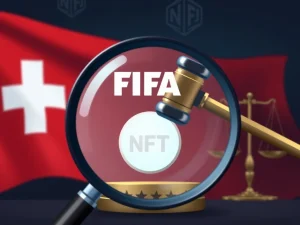Shocking Allegations: NFT Founder Sued Over Millions Stolen from Bitcoin Project

Startling accusations have emerged in the cryptocurrency space, particularly for those following NFT and Bitcoin developments. A prominent NFT founder is now facing a serious legal challenge, with former business partners alleging he misappropriated millions from both an NFT venture and a related Bitcoin project. This development highlights the potential risks and legal complexities within the rapidly evolving digital asset market.
Investors Allege NFT Founder Stole Millions
Several investors allege that Jonathan Mills, the founder behind the Hashling NFT project and a Bitcoin mining operation, defrauded them out of promised equity returns and profits. According to a court filing on May 14 in Illinois, the plaintiffs claim Mills failed to transfer assets and allegedly siphoned off significant funds.
Key allegations include:
- Mills allegedly lied about transferring assets from the Hashling NFT project and at least $3 million from the Bitcoin mining operation to a holding company he controlled, Satoshi Labs LLC (formerly Proof of Work Labs LLC).
- Plaintiffs claim they received no equity returns despite promises.
- Investors contributed a combined $1.46 million through two NFT drops on the Solana and Bitcoin blockchains but saw no returns.
- Mills allegedly became unresponsive after funds were raised.
- He is accused of creating a deliberately flawed shareholder agreement to support his false claims about asset control.
The Core of the Fraud Lawsuit
The plaintiffs have filed a fraud lawsuit against Mills, also claiming breach of fiduciary duty. They argue that Mills’ actions constituted deliberate deception and a failure to act in their best interest as a business partner.
The lawsuit centers on the alleged misdirection of funds and assets intended for the projects and investors. The plaintiffs are seeking not only legal restitution but also a constructive trust over the project’s assets, aiming to recover what they believe was stolen or misappropriated.
Examining the Shareholder Agreement and Structure
Central to the investors allege their claims is the shareholder agreement for Proof of Work Labs (later Satoshi Labs). The plaintiffs describe this agreement as “rife with errors,” suggesting it was designed to mislead. Under this agreement, Mills was set to receive a 67% equity share and voting stake.
In contrast, several investors who contributed up to $20,000 each were allocated only a 2% equity share. Mills allegedly assured these investors their stakes would remain unchanged despite the company’s name change. The significant disparity in equity and voting power, combined with the alleged failure to deliver returns, forms a key part of the plaintiffs’ case.
The Genesis of the Hashling NFT Project
The Hashling NFT project reportedly originated from discussions between Mills and one of the plaintiffs, Dustin Steerman. Despite initially admitting he lacked funds and NFT experience, Mills expressed willingness to contribute ideas and effort.
To bolster the project, Mills and Steerman brought in other investors (the current plaintiffs) who helped with various aspects, including art, marketing, and attending industry events. Even Mills’ girlfriend allegedly invested in the Hashling NFTs, according to the plaintiffs. This collaborative beginning makes the subsequent allegations of a crypto scam particularly jarring for those involved.
Broader Implications for the Crypto Ecosystem
Allegations of this nature, involving a well-known NFT founder and a significant Bitcoin project, can impact investor confidence across the digital asset landscape. As the market matures, legal disputes over fund management, equity, and transparency are becoming more common.
Cases like this underscore the importance of clear, legally sound agreements and due diligence for both founders and investors in crypto ventures. While the legal process will determine the truth of the investors allege claims, the lawsuit itself serves as a cautionary tale about the potential for fraud in this space.
Conclusion: Awaiting Resolution in the Fraud Lawsuit
The fraud lawsuit against Jonathan Mills is ongoing. The plaintiffs are seeking justice and the recovery of funds they believe were improperly handled. This case highlights the legal risks inherent in crypto projects and the challenges investors face when trust is allegedly broken. The outcome of this lawsuit could have implications for how similar ventures structure their agreements and manage investor relations in the future, potentially offering clearer guidelines or precedents in cases involving alleged crypto scam activities by project leaders.









